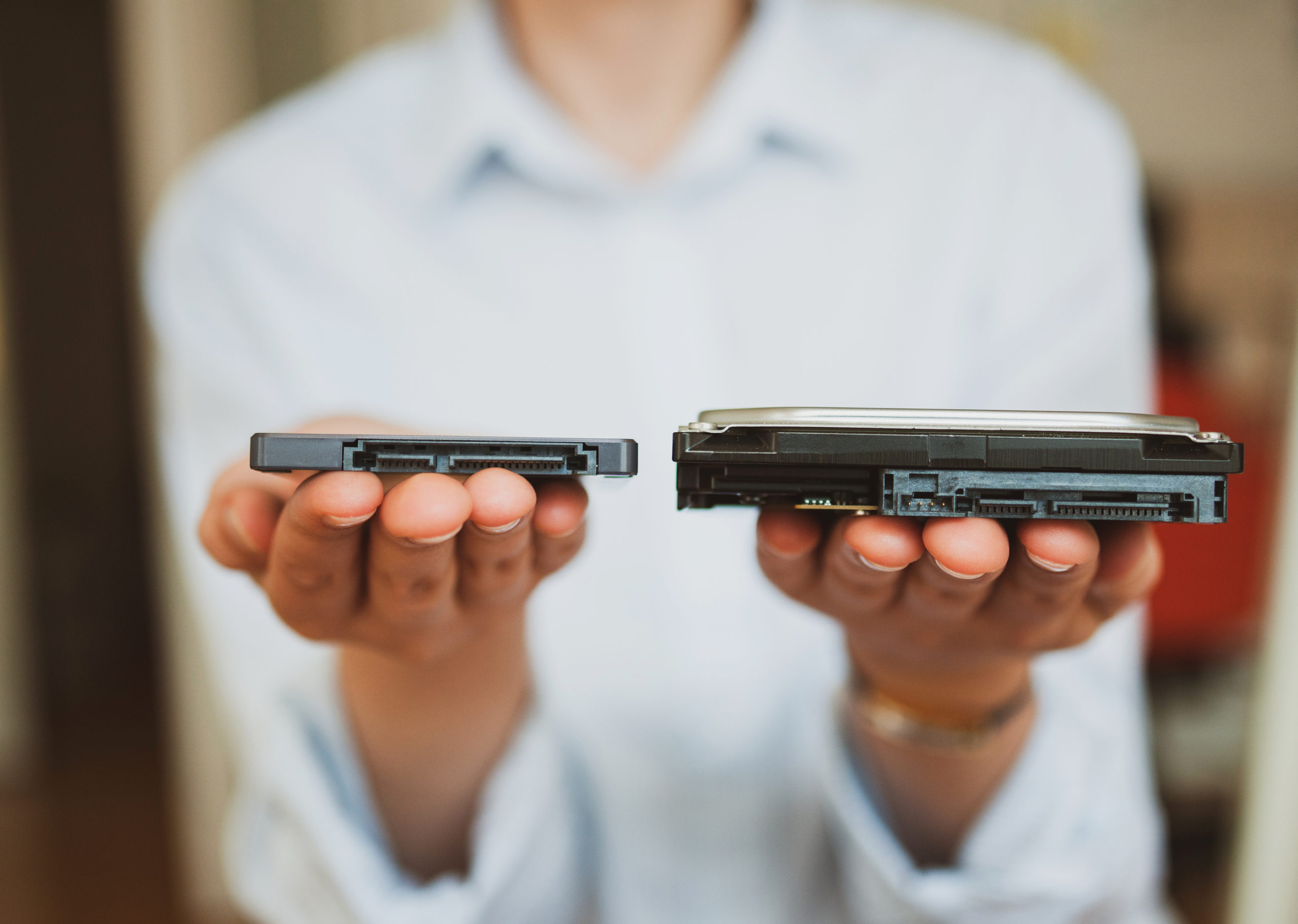Why SSDs Have Surpassed RAM as the Best Performance Upgrade for Your PC/Laptop

When you’re struggling with a slower computer, you want to find the best solution you can to speed things up and get more power.
Some of the symptoms of needing a laptop or PC upgrade include applications taking forever to open, freezing accompanied by that frustrating spinning wheel, and difficulty with multi-tasking.
Two of the key upgrades that can be done to help speed up performance are increasing RAM (random access memory) and upgrading to an SSD (solid-state drive).
While both can be good recommendations, depending upon what type of slowdown you’re experiencing, SSDs are going to give you a super boost of power that surpasses that of a memory upgrade.
Solid-State Drive vs Memory Upgrade
Let’s go over what each type of computer upgrade can do for you, then we’ll explain why an SSD upgrade can help you more if you’ve got a slow and sluggish device.
Memory/RAM Upgrades
Adding more RAM to your computer can help improve certain types of performance. For example, if you’re finding that certain memory intensive programs take a while to load and respond or that a webpage with several embedded videos is causing your browser to completely lock up, memory can be the problem.
Random access memory is what your computer uses when it’s performing various tasks. For example, if you’re browsing webpages, then your browser is using X amount of RAM. Once you close your browser, it releases that RAM, which can then be used by another program.
What happens if you have too little RAM is that the programs you currently have opened, plus any system processes that run in the background (like a Dropbox app), may be hitting a memory ceiling, thus freezing and slowdown occurs with all of them as they fight for memory allocation.
The basic amount of memory most desktops and laptops will come with is 4GB, but if you do anything more than work in a word processing program or other simple apps, you’re going to experience memory-related freezing problems with that level of RAM. In this case upgrading to 8GB of memory is going to improve application performance because you’re raising the memory ceiling.
SSD Upgrades
An SSD is a storage device that can replace a standard mechanical hard drive. But it’s not just for expanding storage capacity. Solid-state drives use what’s called flash-based memory and do not have any moving parts, unlike standard hard drives.
This allows the entire reading and writing process of data as you’re working in programs to be sped up significantly. This is because the drive doesn’t have to take time to search for a specific area on a spinning internal platter to find the data you’re trying to access (which can be a program you’ve launched or a file you’re opening). With flash-based memory the data is instantly accessible.
The type of RAM that SSDs use to store data is different than system RAM. SSDs use non-volatile RAM (NVRAM), meaning the data stays in place when your computer is turned off.
Other benefits that SSDs have over traditional hard drives are that they consume less power, produce less heat, and are less susceptible to physical jolts (making them great for laptops, especially).
Here are a few statistics on HD to SSD comparisons to show you just what kind of boost they can give your PC:
- SSD storage access time is 0.1ms, compared to 5.5-8.0ms for an HD.
- SSD energy consumption 2-5 Watts, compared to 6-15 Watts for an HD.
- SSD input/output request time avg. 20ms, compared to 400-500ms for an HD.
What all those statistics add up to is significantly better performance, including faster boot times, faster application performance, and better efficiency.
Why a Solid-State Drive is a Better Upgrade Option Than RAM
There’s no reason you can’t upgrade both memory and your drive, if your computer allows it. But if you’re looking for the better “bang for your buck” then upgrading to an SSD is the better option. Here’s why.
Better Overall PC/Laptop Performance
Your drive is where all your programs and files are actually stored on your computer. So, with faster access to files using the flash-based memory, you get significantly better performance overall, throughout your computer, more so than just a memory upgrade can give you.
Memory Upgrades Can Cause Issues
Certain computers can be quirky when it comes to a memory upgrade. You’ll see a boost in memory performance, but you might also see unexpected system reboots and issues with hardware performance. This is especially true of older Macs but can happen with any type of PC.
Traditional Hard Drives Can be the Slowest Part of a Computer
If your computer has a traditional hard drive, this is typically the slowest part of your computer, and even if you upgrade the RAM, it won’t change the fact that the hard drive has to fetch all the programs and data, which can still cause slow downs and programs to taking a long time to open as it tries to located them on the disk.
SSDs solve this issue completely by giving your system instant access to the data stored on the drive, for much faster program and file opening, saving, and writing.
Do You Have a Slow PC or Laptop in Need of an Upgrade?
There’s no need to struggle with a slow computer. Our C Solutions team can handle an SSD upgrade (or any other type needed) to speed up your system significantly.
Schedule a free upgrade consultation today! Call 407-536-8381 or reach us online.
